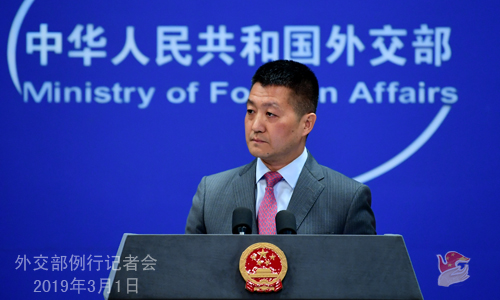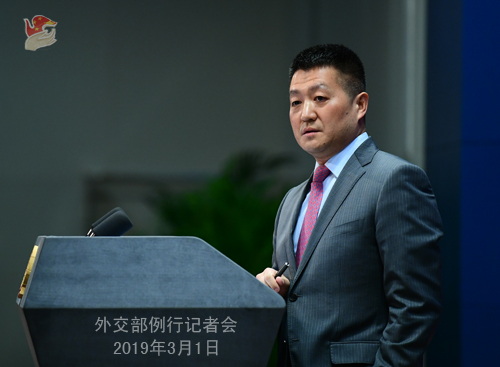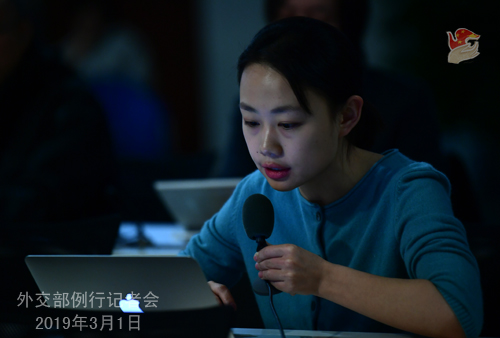| Foreign Ministry Spokesperson Lu Kang's Regular Press Conference on March 1, 2019 |
| 2019-03-02 00:53 |
|
Q: On February 28, the UN Security Council voted on a draft resolution put forward by the US regarding the Venezuela issue, which was not adopted because China and Russia voted against it. What is your comment? A: China has expounded on its principled position on the Venezuela issue many times. China supports the efforts made by the Venezuelan government to uphold national sovereignty, independence and stability, and believes that the Venezuelan affairs should be determined independently by its people. In light of the current situation, China calls on the Venezuelan government and the opposition to seek political settlement through dialogue and consultation under the framework of the Constitution and law. As for the voting of the draft resolution at the Security Council yesterday, I'd like to say that when dealing with Venezuela-related issues, China is committed to upholding the spirit of the UN Charter and the basic norms governing international relations, promoting peaceful settlement, and safeguarding the long-term peace and development of the Latin American region. China opposes any external interference in the internal affairs of Venezuela as well as military intervention. To our regret, the draft resolution put forward by the US side was far from our aforementioned principles and position. That's why China had to vote against it. Peace and stability of Venezuela serve not only the fundamental interests of the country and its people, but also the common interests of all parties. We hope that on the premise of respecting Venezuela's sovereignty, the international community can make constructive efforts that are truly conducive to the country's national stability, economic development and people's livelihood, and promote an early and smooth settlement of the relevant issue. Any move taken by the Security Council on this issue should be in line with the aforementioned principles. Q: The DPRK-US summit in Hanoi didn't yield an agreement. What does China think of the prospect of future dialogue and the political settlement of the Peninsula issue? Also, Foreign Minister of the DPRK Ri Yong-ho stated in Hanoi on February 28th that the DPRK did not ask for sanctions to be lifted in their entirety as the US put it, but only the lifting of part of the sanctions disrupting its people's livelihood. US President Donald Trump also said on the 28th that he wants to "take off the sanctions so badly" because he wants "that country to grow", and he wants "a lot to be given up" by the DPRK. What's your comment? A: The international community has been following the second DPRK-US summit in Hanoi closely. During his meeting with Deputy Foreign Minister Ri Gil-song of the DPRK, State Councilor and Foreign Minister Wang Yi stated China's view on the summit. Both the DPRK and the US, as we have noted, expressed willingness to keep in contact and continue dialogue. China welcomes that. Realizing denuclearization and enduring peace on the Korean Peninsula is the prevailing trend and the shared aspiration and consensus of the international community. With the concerted efforts of all parties, the general direction to achieve political settlement through dialogue has been clear, which is to advance denuclearization and the establishment of a peace mechanism in parallel. We hope the US and the DPRK will continue to engage in dialogue, meet each other half way and accommodate each other's legitimate concerns on the basis of mutual respect, so as to push forward the political settlement of the Peninsula issue. China will continue to play a constructive role to this end. China has noted the statements from both sides regarding the lifting of sanctions after the summit. Despite persistent differences, both countries acknowledged that sanctions relief is an important part of the denuclearization process and that the two should be considered and done in tandem. This represents a common denominator that should be kept in mind. It has been China's consistent position that the Security Council should, pursuant to provisions of relevant resolutions and taking into account positive progress on the Korean Peninsula, especially DPRK's steps toward denuclearization, begin discussing invoking relevant provisions to modify sanctions according to the principle of synchronized and reciprocal steps. Under current circumstances, we sincerely urge all parties to approach this issue constructively and contribute to the comprehensive resolution of this issue. Q: US Secretary of State Mike Pompeo made some comments about China in Manila. One was that countries should have their eyes wide open about the risks posed by Chinese technology. And second, he said that the United States will defend the Philippines if it came under attack in the South China Sea. How does the Chinese government respond to these comments? A: On the South China Sea issue, we have made clear our position many times. I can repeat it here. As you can see, thanks to the concerted efforts by regional countries, the situation in the South China Sea is generally stable and sound. All parties concerned are committed to advancing consultations on the COC and upholding regional peace and stability. If non-regional countries, for example the US, truly wish for peace, tranquility and wellbeing for people in the region, they should stay away from stirring up troubles. As for your first question that US Secretary of State Mike Pompeo wants other countries to keep their eyes wide open and watch out for the threats they face, I think he can rest assured because no others will know better than the countries concerned and their own people where the interests lie. Q: Pakistan's Prime Minister Imran Khan yesterday said that the Indian pilot in Pakistan's custody would be released today. I was wondering if China has played any behind-the-scene role in facilitating the release of the Indian pilot? A: From the very beginning, China has been calling on both India and Pakistan to exercise the utmost restraint and take measures to resolve problems and ease tensions between the two sides through dialogue. I noted the situation you just mentioned. The Chinese side welcomes the above-mentioned decision of the Pakistani side and the signal of goodwill it sent to India. India and Pakistan are each other's neighbors that cannot move away. The de-escalation of tensions between the two countries is in the fundamental interests of both sides. We encourage both parties to continue to meet each other half way, take substantive steps in resolving relevant disputes through consultation and dialogue, and jointly safeguard regional peace and stability. Q: Australian Foreign Minister Marise Payne said that Australia will stick to its decision on banning Huawei from the 5G telecommunications network even if the US backs down. She said that Australia does not want anyone in its communications networks that has an obligation to any other government. What is your comment? A: We are gravely concerned by these remarks. The Chinese government always encourages Chinese enterprises to observe international rules and local laws when carrying out economic cooperation overseas. The Chinese government has never backed any company in doing things that hurt other countries' legitimate security interests. The Australian side should facilitate cooperation between the two business communities, instead of citing various excuses and taking discriminatory measures to obstruct cooperation. We urge the Australian side to discard its ideological prejudice and create a level playing field for Chinese enterprises operating in Australia. Q: Earlier, China's examination on imported coal drew some attention from the media. Some reported that the examination appears to be on Australian coal specifically and speculated that it might have something to do with the recent tensions in China-Australia relations caused by Australia's behavior on 5G and other issues. Is that true? A: China's customs carry out risk monitoring and analysis on the safety of imported coal, and conduct corresponding examination and inspection compliant with laws and regulations. These are normal practices to safeguard public safety, which falls within the responsibility of the Chinese government. Q: In addition to the release of the captured Indian pilot, Pakistan Prime Minister also reiterated his offer to investigate Pulwama incident if India gives credible evidence. What are your comments on this? A: As I said when answering the Indian journalist's question, we have noted relevant reports and we welcome Pakistan's goodwill gesture. China always maintains that India and Pakistan should continue to take more positive measures to create an enabling atmosphere, strive to resolve all outstanding issues between them through dialogue, and jointly stay committed to keeping the region peaceful and stable, including what Prime Minister Imran Khan pledged to do, like you said. It serves the interests of both countries and is what China hopes to see.
Q: According to some reports, the US government recently repatriated over 361 pieces of cultural artifacts originating from China? Could you confirm that? A: That is true. On February 28th, China and the US held a ceremony in Indianapolis where the US returned 361 pieces of seized archeological items originating from China to the Chinese government. This is the third and the largest return since the signing of an inter-governmental MOU on import restrictions of Chinese antiquities. China appreciates the move. Cooperation in preservation of antiquities is an important component of China-US people-to-people and cultural exchanges. We are ready to work with the US side to enhance exchange and cooperation in this area to contribute more to preservation and inheritance of cultural heritage across the world. Q: Canadian Prime Minister Justin Trudeau once said that Canada is a country enjoying judicial independence, where there is no political intervention in judicial affairs. This is also what the Canadian officials said regarding the case of Meng Wanzhou. But according to reports, when testifying at the House of Commons Justice Committee on February 27, former Canadian Attorney General Jody Wilson-Raybould said that from September to December 2018, officials "hounded" her to ask prosecutors to settle the case off court and avoid prosecuting a Canadian engineering company on allegations of corruption. Do you think such practices in the two cases are in fact contradictory? What is your comment? A: I really like your question, yet I think you may need to ask the Canadian government. In fact the case you mentioned has drawn much attention in Canada. We also noted that Canadian media and people in various sectors have raised similar questions. I believe people can tell right from wrong. In fact, not only the Chinese and Canadian people, but the whole world are very interested to hear what the Canadian government will say. Q: After yesterday's summit, the DPRK gets to keep all its nuclear assets including the two reprocessing plants that Trump referred to in his news conference, and there's no date of a new meeting although Trump insisted that everybody left on good terms. This means that the DPRK continues to produce material for nuclear weapons and hasn't given anything up. Does China accept that the DPRK is a nuclear state? A: For what you said at the very beginning, could you tell me whose remarks they are? Follow-up: I'm not saying anybody made these remarks. I'm saying that's a presumption that they keep two reprocessing plants. That's the fact. Does China accept the DPRK as a nuclear power similar to India and Pakistan? The second question is, will Kim Jong Un come to Beijing on his way home from Hanoi? A: Regarding your first question, I would like to say that China has never recognized India and Pakistan as nuclear-weapon states. China's position on the Treaty on the Non-proliferation of Nuclear Weapons (NPT) remains firm and unchanged. As to your second question, like I said in these two days, Chairman Kim Jong Un is now on a friendly visit in Vietnam. It is not in China's position to release any information on behalf of the government of another country. Q: The 27th Meeting of the China-ASEAN Joint Working Group on the Implementation of the Declaration on the Conduct of Parties in the South China Sea (JWG-DOC) was recently held. Could you share us more information? A: China and ASEAN held the 27th Meeting of the China-ASEAN Joint Working Group on the Implementation of the Declaration on the Conduct of Parties in the South China Sea (JWG-DOC) in Nay Pyi Taw, Myanmar on February 27 and 28, which is the first JWG-DOC meeting of this year. During the meeting, China and ASEAN countries had an in-depth and candid exchange of views on the implementation of the DOC and the consultations on the COC. Last year, the Chinese leadership proposed to finish consultations on the COC in three years' time, a vision that has been echoed by ASEAN countries. During this meeting, China and ASEAN countries kept the momentum for dialogue and cooperation, moved forward the COC text reviewing in an efficient and orderly manner, and accumulated more consensus. The consultations on the COC text went well in general. Q: On February 28 local time, Senegal's National Vote Counting Commission released the official result of its presidential election. The incumbent President Macky Sall won the election with 58.27 percent of the vote. What is your comment? A: We noted that Senegal's National Vote Counting Commission released the official result of its presidential election. We congratulate President Sall on his re-election and believe that under his leadership, Senegal will score greater achievements in its national development. China and Senegal are good friends and partners. In recent years, our two countries have deepened our comprehensive strategic cooperative partnership, and our bilateral cooperation in various fields has yielded new outcomes. China and Senegal, as co-chairs of the Forum on China-Africa Cooperation (FOCAC), shoulder important responsibilities in moving forward the comprehensive strategic partnership of cooperation between China and Africa. We stand ready to closely cooperate with the new Senegalese government, elevate the friendly cooperation between China and Senegal and between China and Africa, and deliver more benefits to the people of China, Senegal and Africa beyond by implementing the outcomes of the FOCAC Beijing Summit. Q: European Union leaders have been recently expressing concerns about the number of Chinese companies that have gone to Europe to buy European companies. Now the European Union has been considering taking steps to try and prevent this. Some European Union officials also say that China has not moved fast enough on addressing concerns of European companies. For example, market access. How is China able to convince Europe that it has nothing to worry about? And is China concerned about the European Union's plans or considerations to perhaps move to limit Chinese companies buying European companies? A: In the era of rapid economic globalization, the interests of countries have been closely intertwined. Against such backdrop, promoting trade and investment liberalization and facilitation makes an effective way and means to achieve the optimal allocation of resources and the most efficient production and bring more benefits to all participating parties. European countries have been championing trade and investment liberalization and facilitation, which enables it to gain tangible benefits in the process of globalization and its trade and investment cooperation with other parties, including China. We believe that it is in the common interests of all relevant parties, including China and Europe, to uphold an open world economy and share opportunities and interests in opening-up. We hope that the EU will continue to maintain open trade and investment market, and provide an open, fair and non-discriminatory environment for foreign enterprises doing business there, including the Chinese ones. As to China's market environment and reform and opening-up, we have achieved remarkable progress in opening up our market over the past four decades or so. I remember I once said that in the World Bank's Doing Business 2019 report, China ranks the 46th in 2018, and in 2017 the number was 78th. China has become the biggest overseas market and the largest source of profits for many EU businesses. I believe European companies have the best say about this. China will steadfastly advance opening up, relax market access for foreign investment, continue to improve investment environment for foreign businesses and continue to enhance the transparency of market regulations. We are committed to creating a more attractive investment environment for foreign enterprises.
|
 |
|


